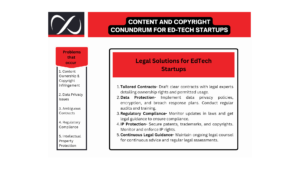
Introduction
EdTech startups in India face numerous legal challenges that can impede their growth and stability. These challenges often arise from issues related to content ownership, copyright infringement, data privacy, contractual ambiguities, and regulatory compliance. Without proper legal counsel, these startups risk potential litigation, financial liabilities, and reputational damage. This article delves into the specific problems faced by EdTech startups, using a case study to illustrate the issues, and provides legal suggestions to help avoid these pitfalls.
First, content ownership and copyright infringement pose significant risks, as unclear usage rights can lead to legal disputes. Second, data privacy issues arise from handling large volumes of sensitive student data, requiring strict adherence to data protection laws. Third, ambiguous contracts with content providers and educators can result in misunderstandings and conflicts. Fourth, regulatory compliance with educational standards and digital content laws is crucial but often challenging. Finally, intellectual property protection for proprietary educational materials and technologies is essential to maintain a competitive edge and prevent misuse by competitors. Addressing these issues through proactive legal strategies is vital for the sustainable growth of EdTech ventures.
Case Study: Content Ownership and Copyright Infringement
An Indian EdTech startup (The Company), a Bangalore-based startup, curates a comprehensive library of educational videos, articles, and assessments, generating millions in revenue. However, their rapid growth has hit a snag due to legal issues surrounding content ownership and has encountered substantial legal hurdles related to content ownership and copyright infringement.The startup faced significant legal challenges due to ambiguities in the contracts with content providers.
One major issue arose when the Company licensed educational videos from a third-party source. The contract did not explicitly state whether the startup could modify the videos, translate them into other languages, or use them for a specific timeframe. ABC modified several videos to better suit their curriculum and translated them into multiple Indian languages to cater to a broader audience. The third-party content provider claimed these actions were beyond the agreed-upon terms, resulting in a copyright infringement lawsuit.
This case highlights the critical importance of clear and comprehensive agreements in EdTech ventures. Ambiguities regarding content ownership and usage rights can lead to costly legal disputes and hinder the growth and reputation of startups.
Detailed Analysis of the Problems
Content Ownership and Copyright Infringement
The Company’s experience underscores the importance of clearly defined content ownership and usage rights. The startup’s contract with the third-party content provider lacked specific terms about modifying, translating, or the duration of content use. This ambiguity led to a copyright infringement lawsuit when the Company altered and translated the educational videos.
This problem is common in the EdTech industry, where startups often curate and modify content to better serve their audience. Without explicit agreements, startups risk overstepping usage rights, resulting in legal disputes and financial penalties. Properly drafted contracts that outline the scope of usage, including modifications and translations, can prevent such issues.
Data Privacy Issues
Handling large volumes of sensitive student data is a significant challenge for EdTech startups. The Company collected extensive data from students using their platform, including personal information, academic records, and usage patterns. Compliance with data protection laws, such as the Indian Personal Data Protection Bill, is crucial to avoid legal repercussions.
The Company faced scrutiny when a data breach exposed sensitive student information, leading to an investigation by regulatory authorities. The startup’s data protection measures were found inadequate, resulting in fines and a loss of trust among users. This incident highlights the need for robust data privacy policies and regular audits to ensure compliance with data protection regulations.
Ambiguous Contracts
Ambiguous contracts with content providers and educators can lead to misunderstandings and conflicts. The Company’s contracts with third-party content providers lacked clarity on key terms such as content modification rights, usage duration, and payment structures. This ambiguity resulted in disputes and disrupted the startup’s operations.
Clear and detailed contracts that outline all terms and conditions, including content usage rights, payment schedules, and dispute resolution mechanisms, are essential. Engaging legal experts to draft and review contracts can help prevent misunderstandings and protect the interests of all parties involved.
Regulatory Compliance
Regulatory compliance with educational standards and digital content laws is crucial for EdTech startups. The Company faced challenges in meeting the regulatory requirements set by educational authorities and digital content laws. Failure to comply with these regulations can result in fines, legal actions, and damage to the startup’s reputation.
The Company struggled to keep up with the changing regulatory landscape, leading to non-compliance issues. The startup was fined for not adhering to the new digital content guidelines introduced by the government. This situation underscores the importance of staying informed about regulatory changes and implementing necessary adjustments promptly.
Intellectual Property Protection
Protecting intellectual property (IP) is essential for maintaining a competitive edge. The Company developed proprietary educational materials and technologies, but faced issues when competitors attempted to replicate their content. Without robust IP protections, The Company risked losing its competitive advantage and market share.
The Company failure to secure patents and trademarks for their proprietary content and technologies led to a costly legal battle with a competitor. This highlights the need for comprehensive IP strategies, including securing patents, trademarks, and implementing measures to prevent and address IP theft.
Legal Solutions to Avoid These Challenges in EdTech Startups
Tailored Contract Drafting
Engage legal experts specializing in technology and education law to craft tailored contracts for content acquisition, partnerships, and user agreements. These contracts should meticulously detail ownership rights, permitted usage, termination clauses, and dispute resolution mechanisms. By customizing contracts to suit specific business needs and potential scenarios, startups can prevent ambiguities and minimize the risk of contractual disputes.
Comprehensive Data Protection Measures
Implement comprehensive data protection measures in compliance with relevant laws, such as the Indian Personal Data Protection Bill. Legal experts can assist in developing robust data privacy policies, encryption protocols, and breach response plans. Regular audits and employee training on data handling practices ensure ongoing compliance and mitigate the risk of regulatory fines or legal actions due to data breaches.
Proactive Regulatory Compliance
Stay ahead of regulatory changes by proactively monitoring updates in educational standards and digital content laws. Legal experts specializing in regulatory compliance can provide guidance on navigating complex regulatory frameworks and implementing necessary adjustments. By staying informed and proactive in regulatory compliance efforts, startups can avoid penalties and maintain regulatory compliance.
Strategic Intellectual Property Protection
Develop a strategic intellectual property (IP) protection strategy under the guidance of legal experts specializing in IP law. This includes securing patents, trademarks, and copyrights for proprietary technologies, content, and branding. Implementing robust IP monitoring and enforcement measures ensures timely detection and mitigation of infringement risks, safeguarding the startup’s innovations and market position.
Continuous Legal Guidance
Establish an ongoing relationship with legal counsel to provide continuous guidance and support on legal matters. Legal experts can offer proactive advice on emerging legal issues, industry best practices, and risk mitigation strategies. Regular legal assessments and updates ensure that the startup remains legally resilient and prepared to navigate any challenges that may arise in the dynamic EdTech landscape.
Conclusion
EdTech startups in India, such as The Company, face significant legal challenges that can hinder their growth and sustainability. These challenges include navigating content ownership and copyright infringement, ensuring data privacy, drafting clear contracts, maintaining regulatory compliance, and protecting intellectual property. By engaging legal experts early, implementing robust data privacy policies, developing clear and detailed contracts, staying informed about regulatory changes, and prioritizing intellectual property protection, EdTech startups can mitigate these risks and foster long-term success. Proactive legal strategies are essential for building trust with customers, maintaining credibility, and achieving sustainable growth in the rapidly evolving EdTech industry. The experiences of ABC illustrate the importance of integrating competent legal counsel into the strategic planning of EdTech startups to navigate the complexities of the legal landscape effectively.









